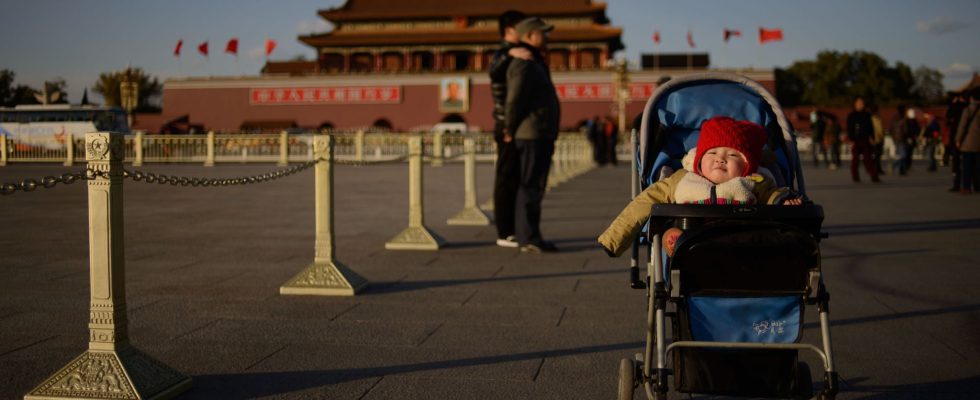Cost of education, growing rejection of marriage: the decline of the Chinese population accelerated in 2023, according to official data published Wednesday January 17, extending a fall that began in 2022 after six decades of growth.
Long the most populous country in the world, China lost its title to India last year, according to the UN. This downward trend is expected to continue over the coming decades.
More family allowances
Faced with the predicted demographic crisis, the government is making abundant communications in favor of the birth rate and local authorities are now paying more family allowances – which remain modest. Without much effect for the moment. “At the end of 2023, the national population was 1.40967 billion people” or “a decrease of 2.08 million compared to the end of 2022,” the National Bureau of Statistics (NBS) announced on Wednesday.
Last year’s decline was more than double that of 2022, when the country lost 850,000 people and its population shrank for the first time since the 1960s.
The figure only includes individuals of Chinese nationality residing in mainland China. It does not include foreigners or residents of the semi-autonomous territories of Hong Kong and Macau. “In 2023, the number of births was 9.02 million,” the BNS also announced on Wednesday, a figure down compared to 9.56 million in 2022.
“Impossible to reverse”
The average number of children per woman in China peaked at more than 7 in the 1960s. But it has fallen to a very worrying 1.05 in 2022, independent demographer He Yafu tells AFP, who says he is basing himself on official figures.
How to explain this? Among the main reasons are the high cost of raising a child and the growing distrust of younger generations towards the institution of marriage – a necessary step in China before having a baby. The increasing number of women pursuing higher education is also delaying the age of first pregnancy.
The Chinese government launched its “one child” policy in the early 1980s in order to stem its exponential population growth. But it has gradually been relaxed in recent years to boost the birth rate. Since 2021, all couples can have three children. No effort: “the trend of decline in the Chinese population is fundamentally impossible to reverse” because the younger generations “are generally no longer willing to have many children”, He Yafu told AFP.
To slow down this fall, He Yafu is calling for more family allowances, childcare solutions and even the possibility of sending his children to nursery school earlier.
A great senior plan
The problems caused by this demographic crisis and the aging of the population currently underway are multiple. Particularly on the economic level: China has long relied on its vast workforce to stimulate its growth. The decline in the number of people of working age is expected to have repercussions.
Another problem is social. Tradition requires in China to take care of elderly parents, to an even greater degree than in Western societies. But since most couples in China today are made up of two adults who are only children, they have a lot to do in having to take care of their four elderly parents. A burden that becomes very important.
To try to compensate for this phenomenon, China presented this week a major seniors plan, which could amount to thousands of billions of euros, to cope with the growing need for services in the sector (retirement homes, entertainment, home care or even meal delivery). What about, moreover, the use of immigration as a solution to demographic decline?
“This is not viable” because “over the coming decades, China’s population will decline by several hundred million people,” estimates He Yafu. This means that “hundreds of millions of people” would have to be brought in, but “the vast majority of Chinese today are opposed to immigration and the authorities are very restrictive in this matter”, underlines- he.
